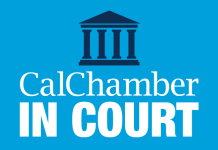A California Chamber of Commerce-supported bill related to food and consumer product packaging was signed by Governor Edmund G. Brown Jr.
CalChamber supports AB 2632 (Santiago; D-Los Angeles) because it protects consumer product and food manufacturers from lawsuits by clarifying package labeling requirements regarding the amount of product and packaging.
Specifically, AB 2632 would ensure that consumer product and food manufacturers cannot be deemed to have violated California’s “slack fill” law when the product’s exterior packaging contains information that clearly communicates the amount and size of the product contained in the packaging. Slack fill is the difference between the actual capacity of a container and the volume of product contained therein.
Over the last 20 years, there have been several attempts to bring clarity and consistency to the implementation of the slack fill law. However, during this same time period, the plain language of the slack fill law–specifically the circumstances where nonfunctional slack fill is deemed to be appropriate–has been open to subjective interpretation, and thus the purpose and meaning of the exemptions first enumerated by the Attorney General in 1988, placed into law by the Legislature in 1997, and updated in 2013, are unclear.
This lack of statutory clarity has resulted in a substantial rise in lawsuits brought under California’s slack fill law in recent years in the form of consumer class actions, as well as suits brought by district attorneys. As such, several food, beverage, consumer products, and general business groups have once again identified the need to clarify several commonly employed methods for communicating the amount of product contained in a package to consumers.
AB 2632 clearly articulates circumstances wherein nonfunctional slack fill would be deemed permissible, and in doing so, adds clarity to product manufacturers and consumers. These exemptions would apply equally to food and non-food commodities.
Specifically, the legislation does three things:
- Provides clarity against enforcement for packages containing a discrete number of products (such as in the case of snack bars), that clearly illustrates the actual size and number of such products on the exterior packaging along with the appropriate size/weight/count information.
- Provides clarity against enforcement for exterior packages that contain a clearly and conspicuously labeled “fill line.”
- Provides that when the mode of commerce does not allow a customer to see or handle a package prior to purchase, slack fill is not an enforceable concern. This is important for e-commerce, drug purchases and alcoholic beverages.
Like SB 465 in 2013, AB 2632 would again update the slack fill statutes with common sense opportunities to convey information to the consumer and reduce unnecessary enforcement actions by adding additional clarity to the slack fill requirements.
Staff Contact: Adam Regele


